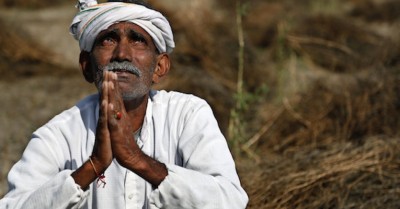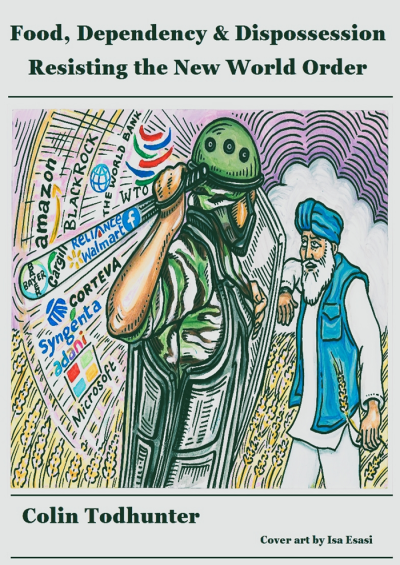Farmers’ Protest in India Reignites. A Struggle for the Future of Food and Agriculture
Resistance to "Neoliberal Corporatization"

All Global Research articles can be read in 51 languages by activating the Translate Website button below the author’s name (only available in desktop version).
To receive Global Research’s Daily Newsletter (selected articles), click here.
Click the share button above to email/forward this article to your friends and colleagues. Follow us on Instagram and Twitter and subscribe to our Telegram Channel. Feel free to repost and share widely Global Research articles.
Big Tech’s Effort to Silence Truth-tellers: Global Research Online Referral Campaign
***
In 2021, after a year-long protest, India’s farmers brought about the repeal of three farm laws that were intended to ‘liberalise’ the agriculture sector. Now, in 2024, farmers are again protesting. The underlying issues and the facilitation of the neoliberal corporatisation of farming that sparked the previous protest remain and have not been resolved.
The World Bank, the World Trade Organization, global agribusiness and financial capital are working to corporatise India’s agriculture sector. This plan goes back to the early 1990s and India’s foreign exchange crisis, which was used (and manipulated) to set this plan in motion. This ‘structural adjustment’ policy and process involves displacing the current food production system with contract farming and an industrial model of agriculture and food retail that serves the above interests.
The aim is to reduce the role of the public sector in agriculture to a facilitator of private capital, which requires industrial commodity-crop farming. The beneficiaries will include Cargill, Archer Daniels Midlands, Louis Dreyfus, Bunge and India’s retail and agribusiness giants as well as the global agritech, seed and agrochemical corporations and the big tech companies with their ‘data-driven agriculture’.
The plan is to displace the peasantry, create a land market and amalgamate landholdings to form larger farms that are more suited to international land investors and industrial farming. As a result, there has been an ongoing strategy to make farming non-viable for many of India’s smallholder farmers and drive hundreds of millions out of farming and into urban centres that have already sprawled to form peri-urban areas, which often tend to contain the most agriculturally fertile land. The loss of such land should be a concern in itself.
And what will those hundreds of millions do? Driven to the cities because of deliberate impoverishment, they will serve as cheap labour or, more likely, an unemployed or underemployed reserve army of labour for global capital — labour which is being replaced with automation. They will be in search of jobs that are increasingly hard to come by the (World Bank reports that there is more than 23% youth unemployment in India).
The impoverishment of farmers results from rising input costs, the withdrawal of government assistance, debt and debt repayments and the impacts of cheap, subsidised imports, which depress farmers’ incomes.
While corporations in India receive massive handouts and have loans written off, the lack of a secure income, exposure to volatile and manipulated international market prices and cheap imports contribute to farmers’ misery of not being able to cover the costs of production and secure a decent standard of living.
The pressure from the richer nations for the Indian government to further reduce support given to farmers and open up to imports and export-oriented ‘free market’ trade is based on nothing but hypocrisy. For instance, according to policy analyst Devinder Sharma, subsidies provided to US wheat and rice farmers are more than the market worth of these two crops. He also notes that, per day, each cow in Europe receives a subsidy worth more than an Indian farmer’s daily income.
The World Bank, the World Trade Organization, global institutional investors and transnational agribusiness giants require corporate-dictated contract farming and full-scale neoliberal marketisation for the sale and procurement of produce. They demand that India sacrifice its farmers and its own food security for the benefit of a handful of billionaires.
Farmers are merely regarded as producers of raw materials (crops) to be fleeced by suppliers of chemical and biotech inputs and the food processing and retail conglomerates. The more farmers can be squeezed, the greater the profits these corporations can extract. This entails creating farmer dependency on costly external inputs and corporate-dominated markets and supply chains. Global agrifood corporations have cleverly and cynically weaved a narrative that equates eradicating food sovereignty and creating dependency with ‘food security’.
Farmers’ Demands
In 2018, a charter was released by the All India Kisan Sangharsh Coordination Committee (an umbrella group of around 250 farmers’ organisations). The farmers were concerned about the deepening penetration of predatory corporations and the unbearable burden of indebtedness and the widening disparities between farmers and other sectors.
They wanted the government to take measures to bring down the input costs of farming, while making purchases of farm produce below the minimum support price (MSP) both illegal and punishable.
The charter also called for a special discussion on the universalisation of the public distribution system, the withdrawal of pesticides that have been banned elsewhere and the non-approval of genetically engineered seeds without a comprehensive need and impact assessment.
Other demands included no foreign direct investment in agriculture and food processing, the protection of farmers from corporate plunder in the name of contract farming, investment in farmers’ collectives to create farmer producer organisations and peasant cooperatives and the promotion of agroecology based on suitable cropping patterns and local seed diversity revival.
These demands remain relevant today due to government inaction. In fact, the three farm laws that were repealed after a year-long protest by farmers in 2021 aimed to do precisely the opposite. They were intended to expose Indian agriculture to a massive dose of neoliberal marketisation and shock therapy. Although the laws were struck down, the corporate interests behind them never went away and are adamant that the Indian government implements the policies they require.
This would mean India reducing the state procurement and distribution of essential foodstuffs and eradicating its food buffer stocks — so vital to national food security — and purchasing the nation’s needs with its foreign exchange reserves on manipulated global commodity markets. This would make the country wholly dependent on attracting foreign investment and international finance.
To ensure food sovereignty and national food security, the Mumbai-based Research Unit for Political Economy (RUPE) says that MSPs, through government procurement of essential crops and commodities, should be extended to many major cops such as maize, cotton, oilseed and pulses. At the moment, only farmers in certain states who produce rice and wheat are the main beneficiaries of government procurement at the MSP.
Since per capita protein consumption in India is abysmally low and has fallen further during the liberalisation era, the provision of pulses in the public distribution system (PDS) is long overdue and desperately needed. The PDS works with central government, via the Food Corporation of India, being responsible for buying food grains from farmers at MSPs at state-run market yards or mandis. It then allocates the grains to each state. State governments then deliver to ‘ration shops’.
Today, in 2024, farm union leaders are (among other demands) seeking guarantees for a minimum purchase price for crops. Although the government announces support prices for more than 20 crops each year, government agencies buy only rice and wheat at the support level and, even then, in only some states.
State agencies buy the two staples at government-fixed minimum support prices to build reserves to run the world’s biggest food welfare programme that entitles more than 800 million Indians to free rice and wheat. Currently, that’s more than half the population who per household will receive five kilos per month of these essential foodstuffs for at least the next four years, which would be denied to them by the ‘free market’. As we have seen throughout the world, corporate plunder under the guise of neoliberal marketisation is no friend of the poor and those in need who rely on state support to exist.
If public procurement of a wider range of crops at the MSP were to occur — and MSPs were guaranteed for rice and wheat across all states — it would help address hunger and malnutrition, encourage crop diversification and ease farmer distress. Indeed, as various commentators have stated, by helping hundreds of millions involved in farming this way, it would give a massive boost to rural spending power and the economy in general.
Instead of rolling back the role of the public sector and surrendering the system to what constitutes a transnational billionaire class and its corporations, there is a need to further expand official procurement and public distribution.
The RUPE notes, it would cost around 20% of the current handouts (‘incentives’) received by corporations and their super-rich owners, which do not benefit the bulk of the wider population in any way. It is also worth considering that the loans provided to just five large corporations in India were in 2016 equal to the entire farm debt.
However, it is clear that the existence of the MSP, the public distribution system and publicly held buffer stocks are an impediment to global agribusiness interests.
Farmers’ other demands include a complete debt waiver, a pension scheme for farmers and farm labourers, the reintroduction of subsidies scrapped by the Electricity (Amendment) Bill 2020 and the right to fair compensation and transparency concerning land acquisitions.
In the meantime, the current administration is keen to demonstrate to international finance capital and agricapital that it is being tough on farmers and remains steadfast in its willingness to facilitate the pro-corporate agenda.
After the recent breakdown in talks between government and farmers’ representatives, the farmers decided to peacefully march to and demonstrate in Delhi. But at the Delhi border, farmers were met with barricades, tear gas and state violence.
Farmers produce humanities’ most essential need and are not the ‘enemy within’. The spotlight should fall on the ‘enemy beyond’. Instead of depicting farmers as ‘anti-national’, as sections of the media and prominent commentators in India try to, the focus needs to be on challenging those interests that seek to gain from undermining India’s food security and sovereignty and the impoverishment of farmers.
The issues discussed in the above article are set out in the author’s free-to-read book (2022), which can be accessed below.
*
Note to readers: Please click the share button above. Follow us on Instagram and Twitter and subscribe to our Telegram Channel. Feel free to repost and share widely Global Research articles.
Renowned author Colin Todhunter specialises in development, food and agriculture. He is a Research Associate of the Centre for Research on Globalization (CRG).
 Read Colin Todhunter’s e-Book entitled
Read Colin Todhunter’s e-Book entitled
Food, Dispossession and Dependency. Resisting the New World Order
We are currently seeing an acceleration of the corporate consolidation of the entire global agri-food chain. The high-tech/big data conglomerates, including Amazon, Microsoft, Facebook and Google, have joined traditional agribusiness giants, such as Corteva, Bayer, Cargill and Syngenta, in a quest to impose their model of food and agriculture on the world.
The Bill and Melinda Gates Foundation is also involved (documented in ‘Gates to a Global Empire‘ by Navdanya International), whether through buying up huge tracts of farmland, promoting a much-heralded (but failed) ‘green revolution’ for Africa, pushing biosynthetic food and genetic engineering technologies or more generally facilitating the aims of the mega agri-food corporations.

